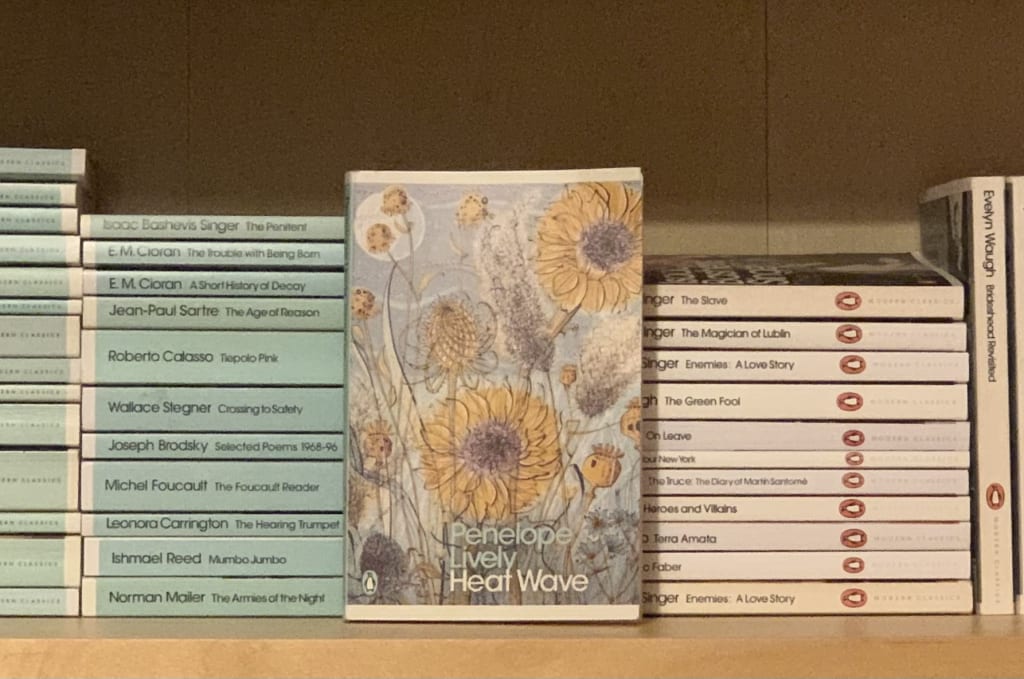Book Review: "Heat Wave" by Penelope Lively
5/5 - Atmospheric manipulation at its modernist best...

Penelope Lively’s books are always filled with one great thing and this book is no exception - this great thing is amazing and vivid descriptions of the surrounding area blended with atmospheric moods and different hues of emotion. Her writing is a brilliant way of analysing landscape in the modern era and how it is manipulated to suit a certain situation and mood. For example: in “Heat Wave” we get these images of a place called “World’s End” which is described as being almost altered by each and every movement of emotion in the book. When we learn about the weird affairs that are happening in the book we see the atmosphere around World’s End change with it and I think that this is the single greatest thing about the book. The descriptions are written with such character and fine wording it sounds like Penelope Lively chose each individual word to put in that quotation.
So let us now have a look at some quotations that I particularly loved from this book and discuss what makes them so amazing:
“The whole place is of course radiant with electricity and central heating. It ticks and tocks with timing and mechanisms and remote-control devices. Computers and faxes stand waiting in Pauline’s study and in Maurice’s. Both of them can tap into a global communication network, both can conjure up the information resources of distant libraries. World’s End is a wolf in sheep’s clothing - it is no more rooted in a time and a place than is the flight deck of a seven four seven. A curious name for a row of cottages - World’s End. When Pauline bought the place ten years’ ago, she was puzzled by the term but found no explanation until Maurice pointed out that such names were often given to farm labourers’ dwellings sited out in the fields in the last century - new constructions away from village centres and labelled accordingly, places that seemed remote, or - ironically - idyllic. World’s End. Botany Bay. Tasmania. Utopia Cottages. Paradise Row. He three out the observation casually off hand, standing down there on the track the first time he came there, before he married Teresa - a though it were the sort of thing everyone knew.”
You see how the situation of Teresa being married is woven into the atmosphere as Pauline also has this issue on her mind. We do not know what the issue is, but from the way in which we read words like ‘remote’ and ‘ironic’ and ‘casually’ we read about an atmosphere that is exactly that - casual, but underneath through the lesser positive language, there is something that will sooner or later surface as a major problem.
“The garden at World’s End is a rectangle jutting out into a field. It is the amalgamation of the three long thin strips which were the gardens of the original cottages - the sparse gesture which allowed each labouring family its own small plot on which to grow a few vegetables. And flowers - cottage garden flowers whose descendants tenaciously reappear year after year. At the end of the garden is an orchard of ancient apple trees, way past their prime, which deliver a crop of scabby fruit. There also are presumably relics of the former inhabitants of the place, cherishes assets back then which are united now into a neglected place of lush grass which no one ever gets around to cutting.”
There is something incredibly clever about the way these descriptions build in the fact that there is an issue being realised in the book that is about to surface. The fact that “descendants tenaciously reappear year after year” is something that relates to Pauline’s own situation regarding her daughter Teresa, Teresa’s husband and their child together. Then we have the apple trees which are relative of Pauline’s own situation as her love between her and Teresa’s father is relative to the apple tree and its ‘scabby fruit’ - it was past its prime and no longer held itself together. In her daughter’s issues, she can see her own and she is clearly afraid, but can do nothing but observe the situation.
The book is filled with these little remarks to observation through our own observations and serves as a novel of incredible metaphor and depth. It is brilliant.
About the Creator
Annie Kapur
200K+ Reads on Vocal.
English Lecturer
🎓Literature & Writing (B.A)
🎓Film & Writing (M.A)
🎓Secondary English Education (PgDipEd) (QTS)
📍Birmingham, UK






Comments
There are no comments for this story
Be the first to respond and start the conversation.